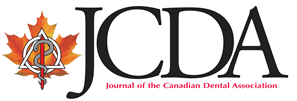 |
Current Issue | Subscriptions | ||||||
| Back Issues | Advertising | |||||||
| More Information | Classified Ads | |||||||
| For Authors | Continuing Education | |||||||
|
||||||||
 |
|
Elderly Canadians Residing in Long-term Care Hospitals: Part I. Medical and Dental StatusFULL TEXT
• Chris C.L. Wyatt, BSc, DMD, MSc • A b s t r a c tObjective: To describe the medical, dietary, oral microbial, oral hygiene and dental status of elderly Canadians living in LTC hospitals in Vancouver and surrounding communities. Methods: A sample of 369 elderly dentate hospital residents (mean age 83.9 years, 281 women [76.2%]) were examined, and their medical status and medications, oral status and type of hospital were documented. Oral hygiene practices and diet (specifically intake of refined carbohydrates) were evaluated. Subjects with xerostomia and subjects taking medications with hyposalivary side effects were identified, and salivary Streptococcus mutans and Lactobacillus were cultured. Results: The mean plaque index was 1.3; men had a higher plaque index than women and residents of extended care hospitals had a higher plaque index than those in intermediate care hospitals. The mean bacterial score per Conclusions: Although almost half of the subjects had visited a dental office in their community within the past 5 years, the elderly hospital residents in this study had few remaining teeth and suffered from poor oral hygiene. Prevention strategies (such as diet, oral hygiene and antimicrobial agents) rather than dental interventions (such as restorations and extractions) alone may be needed to control oral diseases in this susceptible population.
MeSH Key Words: Canada; dental care for aged; health status; oral health
Reply to this article | View replies [0]
|
|
|
Full text provided in PDF format |
|
| Mission Statement & Editor's Message |
Multimedia Centre |
Readership Survey Contact the Editor | Français |
|